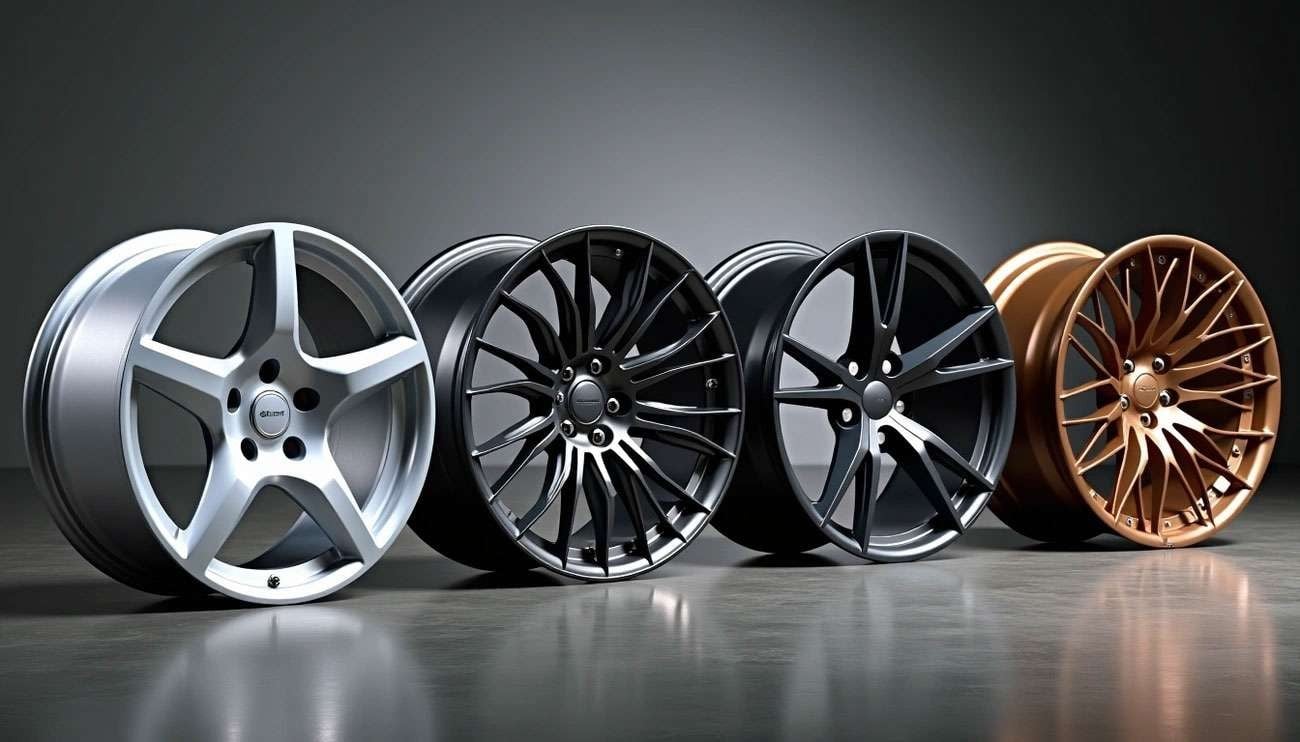
Alloy wheels have become the standard choice for most passenger vehicles today, with aluminum alloy rims dominating the OEM market thanks to their impressive blend of form and function. These lightweight alternatives deliver better fuel efficiency and significantly improved handling performance compared to their heavier steel counterparts.
We carry the best selection of alloy wheels at the lowest prices, and we understand that not all wheels are created equal. Aluminum alloy wheels offer exceptional versatility with diameters ranging from 15 to 24 inches and beyond, while magnesium alloy wheels (often called "mag wheels") provide even lighter weight for enhanced performance. You'll also find variations in construction methods, with one-piece designs dominating the OEM market and forged alloy wheels delivering superior strength through high-pressure metal compression.
Our expert team has created this guide to help you choose from the four popular types of alloy wheels available in 2025. Whether you're seeking to upgrade your vehicle's appearance with stylish designs or improve performance with lightweight options, understanding these different types will ensure you make the right choice for your specific needs.
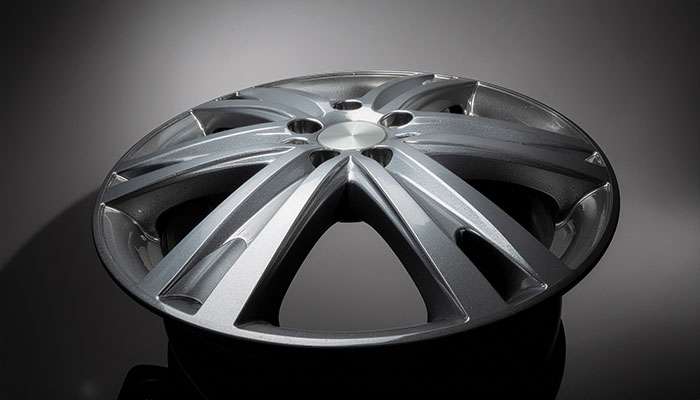
Aluminum alloy wheels dominate both the aftermarket and OEM wheel industry for good reason. Made primarily from aluminum (95-99%) combined with small amounts of other elements like silicon, magnesium, and manganese, these wheels offer an excellent balance of performance, style, and durability. Understanding what makes these wheels so popular among vehicle owners in 2025 is essential before making a purchase decision.
The composition of aluminum alloy wheels creates a product that excels in multiple areas. Most aluminum wheels are created through casting, where molten aluminum alloy is poured into a mold to create complex designs that would be impossible with traditional steel wheels. This manufacturing process allows for intricate, bold designs that enhance the visual appeal of any vehicle.
One of the most notable features of aluminum alloy wheels is their lightweight nature. Compared to traditional steel wheels of the same size, aluminum alloy wheels can significantly reduce unsprung weight—the mass not supported by your vehicle's suspension. This reduction impacts everything from handling to fuel efficiency.
Aluminum alloy wheels provide superior heat conduction, which helps dissipate heat from your brakes more effectively. This characteristic proves particularly beneficial for drivers who frequently tackle hilly terrains or engage in demanding driving conditions.
The surface finish options contribute significantly to their popularity. These wheels can be:
Polished to a high shine
Painted in various colors
Chrome plated for maximum reflectivity
Diamond cut for a premium two-tone effect
Aluminum wheels show excellent resistance to corrosion. When aluminum corrodes, it quickly forms an extremely thin layer of aluminum oxide, which is hard and durable. This thin layer insulates the underlying aluminum and protects it from further oxidization.
Pros:
Lightweight Construction: Aluminum alloy wheels are significantly lighter than steel alternatives, which improves vehicle handling and acceleration by reducing the unsprung mass.
Superior Heat Dissipation: These wheels offer over 3 times higher heat dissipation performance than steel wheels, effectively drawing away brake-generated heat to improve brake efficiency.
Fuel Efficiency: The lighter weight contributes to better fuel economy—in fact, the fuel savings achieved over 20,000 kilometers of driving can be sufficient to offset the initial investment cost.
Aesthetic Appeal: The manufacturing process allows for creative, eye-catching designs that enhance your vehicle's appearance.
Reduced "Wheel Hop": Aluminum alloy wheels decrease the wheel hop commonly observed with steel wheels, thereby reducing the risk of brake failure.
Better Balance: Aluminum alloy wheels provide more precise balance capabilities, contributing to smoother rides.
Compatibility with Tubeless Tires: They work excellently with tubeless tires, which are increasingly standard on modern vehicles.
Cons:
Higher Initial Cost: Aluminum alloy wheels are approximately 2-3 times more expensive than ordinary steel wheels.
Susceptibility to Damage: Despite their strength, aluminum alloy wheels can crack or bend under high impact since the material is less flexible than steel.
Repair Challenges: Alloy wheels are more difficult to repair than steel wheels when bent, though their higher price often makes repairs more economical than replacement.
Limited Lifespan: Even with protective coatings, aluminum wheels will eventually start to corrode after 3-5 years, though refurbishment is possible at a cost.
Cosmetic Vulnerability: These wheels are prone to cosmetic damage such as scratches and dents, especially when exposed to rough terrain or curbs.
The cost of aluminum alloy wheels varies widely based on size, design complexity, manufacturing process, and brand reputation. For 2025, here's what you can expect to pay:
OEM replacement aluminum alloy wheels typically range from $140 to $285 per wheel, with most falling in the $200-250 range. Aftermarket options can be found for similar prices, though premium designs from recognized brands may cost significantly more.
For instance:
Basic 18" aluminum alloy replacement wheels: $140-160
Mid-range 18" alloy wheels with machined finishes: $200-250
Premium 18" alloy wheels with special finishes or designs: $250-285+
When considering a complete set of four wheels, budget anywhere from $560 to $1,140 for a full replacement. This investment, however, may be offset by several factors:
Improved fuel efficiency over time
Enhanced vehicle value
Better performance characteristics
Extended tire life due to improved heat management
Although aluminum alloy wheels have a higher initial cost, they retain substantial value even at end-of-life. Most scrap yards will pay up to 50% of the aluminum market price for these wheels because they can be directly recycled.
Aluminum alloy wheels shine in specific applications where their advantages can be fully realized:
Everyday Passenger Vehicles: For daily drivers seeking improved handling and fuel efficiency without sacrificing comfort, aluminum alloy wheels provide an excellent balance of performance and practicality. Their lightweight nature contributes to better acceleration and braking in urban environments.
Performance and Sports Cars: Vehicles designed for spirited driving benefit tremendously from the reduced unsprung weight and improved heat dissipation. The enhanced responsiveness during acceleration, turning, and braking makes aluminum alloy wheels ideal for performance applications.
Luxury Vehicles: The aesthetic appeal and customization options make aluminum alloy wheels a natural fit for luxury vehicles where appearance matters as much as performance. The vast array of designs allows for personalization that complements the vehicle's lines and overall style.
Vehicles in Moderate Climates: Thanks to their corrosion resistance, aluminum alloy wheels perform particularly well in areas with moderate weather conditions. However, they can struggle in areas with heavy road salt usage unless properly maintained.
Fuel-Conscious Applications: For drivers prioritizing fuel economy, the weight savings from aluminum alloy wheels contribute to overall efficiency, making them ideal for eco-conscious consumers or those with long commutes.
Aluminum alloy wheels represent the most versatile choice for most drivers, offering a compelling mix of performance benefits, aesthetic options, and reasonable durability. Their widespread adoption in both OEM and aftermarket applications demonstrates their balanced attributes that satisfy the needs of most vehicle owners.
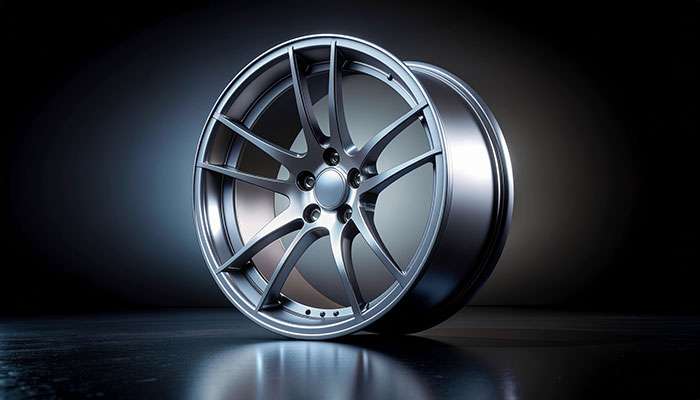
Magnesium alloy wheels represent the pinnacle of lightweight wheel technology in the automotive world. Often considered the gold standard for racing applications, these wheels offer extraordinary performance benefits thanks to their remarkable weight-to-strength ratio. Understanding magnesium wheels is essential if you're seeking the absolute best in wheel performance for 2025.
Magnesium stands out as the lightest structural metal available for wheel manufacturing. It's approximately 1.5 times less dense than aluminum and 4.5 times less dense than steel, making it an ideal material for reducing unsprung weight. This lightweight nature creates the foundation for everything that makes magnesium wheels exceptional.
The material composition of magnesium wheels typically utilizes specialized alloys such as:
AZ91: The most popular casting alloy with good tensile properties
AM60/AM50: Primarily used in pressure die casting with excellent fluidity
ZK61: A high-strength cast alloy grade with zirconium for grain refinement
AZ80: Characterized by high strength and heat treatment capability
Beyond their lightweight properties, magnesium wheels feature exceptional damping capabilities that exceed aluminum wheels by up to 50 times. This means superior vibration absorption, creating a smoother ride quality and reduced stress on vehicle components.
Magnesium wheels excel in thermal conductivity, effectively dissipating heat from brake components. This feature proves crucial during high-performance driving, as it helps maintain brake efficiency by reducing the risk of overheating.
When it comes to manufacturing processes, magnesium wheels are primarily produced through two distinct methods:
Cast magnesium wheels: Created by pouring molten magnesium into molds, resulting in more affordable but slightly heavier wheels
Forged magnesium wheels: Manufactured by mechanically deforming magnesium under high pressure, creating a stronger, lighter product with superior directional strength patterns
One particularly innovative production process combines forging with flow-forming technology, as seen in wheels like the MFR-01, which achieves weights as low as 15.2 lbs (6.9kg) for a 20×9.5-inch wheel.
Pros:
Extreme Weight Reduction: Magnesium wheels offer approximately 30% weight savings compared to forged aluminum wheels, with some manufacturers claiming up to 40% reduction in rotational mass.
Enhanced Performance: The significant weight reduction means improved acceleration, handling, and braking performance due to decreased rotational inertia and unsprung weight.
Superior Heat Management: Magnesium's excellent thermal conductivity helps dissipate brake heat more efficiently than aluminum, reducing the risk of brake fade during intense driving sessions.
Exceptional Vibration Damping: The natural damping properties of magnesium can reduce cabin noise by up to 6 decibels while minimizing vibration stress on suspension components.
Fuel Efficiency: Some manufacturers claim up to 15% improvement in fuel economy thanks to the reduced rotational mass, with urban driving potentially seeing up to 8% savings.
Environmental Benefits: Magnesium is recyclable, making these wheels a more eco-friendly option for environmentally conscious consumers.
Cons:
High Cost: Magnesium wheels command premium prices, often making them prohibitively expensive for average consumers.
Corrosion Concerns: Traditional magnesium wheels have had issues with corrosion resistance, requiring special protective coatings or advanced alloy formulations to address this limitation.
Limited Repairability: Once bent, magnesium wheels typically cannot be straightened, resulting in complete replacement if damaged.
Aging Concerns: Magnesium alloys age and work-harden over time, potentially becoming more brittle, which has led to safety regulations in some regions.
Regulatory Restrictions: Certain racing leagues and regions have restricted magnesium wheels due to concerns about their flammability properties, although modern alloys have largely addressed this issue.
Magnesium wheels represent the premium tier of wheel options, with prices reflecting their advanced materials and manufacturing processes. Unlike aluminum wheels, which are widely available at various price points, magnesium wheels maintain consistently high pricing.
Forged magnesium wheels from reputable manufacturers typically start around $2,800-3,300 per wheel. For instance, the BRAID Forged I Magnesium wheel begins at $2,846, whereas the BRAID BPF-02 Magnesium starts at $3,269.
Complete sets of forged magnesium wheels generally range from $11,000 to $13,000 for a set of four, representing a significant investment over conventional wheels. Even aftermarket options rarely drop below this premium price point.
For motorsport-specific applications like motorcycle racing, purpose-built options such as Marvic Piuma magnesium wheels offer extreme weight reduction—with front wheels weighing just 6.17 lbs and rear wheels 8.59 lbs—at correspondingly premium prices.
First-time buyers may experience sticker shock when comparing magnesium to aluminum options, as the price differential often exceeds 300%. Many performance enthusiasts consider this cost justified by the tangible performance improvements and exclusivity.
Given their unique properties and price point, magnesium wheels work best in specific applications where their benefits justify the investment:
Professional Motorsport: Magnesium wheels have long been the standard in Formula 1, endurance racing, and other professional motorsport categories where every gram of weight reduction provides competitive advantage. Their superior strength-to-weight ratio and heat dissipation capabilities make them ideal for the extreme demands of track use.
High-Performance Street Cars: Owners of exotic and high-performance vehicles often choose magnesium wheels to maximize their vehicle's capabilities. The reduced unsprung and rotational mass provides noticeable improvements in acceleration, braking, and cornering dynamics.
Motorcycles: Racing and high-performance motorcycles benefit tremendously from magnesium wheels. The weight reduction is particularly impactful on two-wheeled vehicles, where handling characteristics are significantly affected by wheel weight.
Track Day Enthusiasts: Serious track day participants who want every performance advantage without the restrictions of professional racing regulations find magnesium wheels offer tangible lap time improvements.
Luxury Statement Pieces: Some luxury vehicle owners select magnesium wheels as exclusive upgrades that combine performance benefits with the prestige of owning the most advanced wheel technology available.
Electric Vehicles: The efficiency benefits of magnesium wheels make them increasingly relevant for performance-oriented electric vehicles, where extended range and improved acceleration are highly valued.
For those seeking the absolute pinnacle of wheel performance and willing to invest accordingly, magnesium alloy wheels deliver unmatched benefits in appropriate applications.
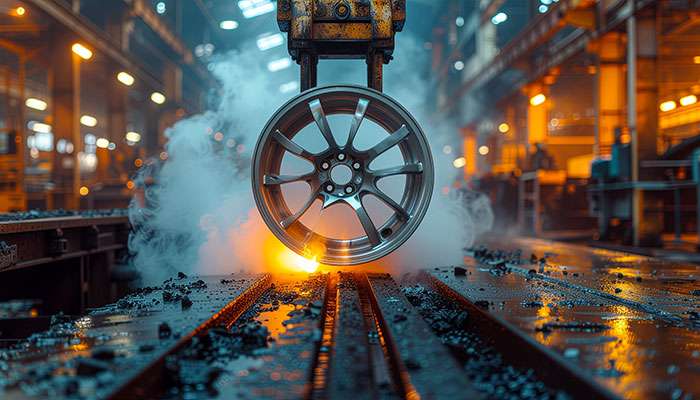
Cast wheels dominate today's automotive market, accounting for nearly 90% of OEM wheels found on most vehicles. This popular manufacturing technique involves pouring molten aluminum into molds, creating versatile designs that balance cost, appearance, and performance. Understanding cast wheels is important before making a purchase, as they offer the most accessible entry point into alloy wheel upgrades.
The casting process begins with heating aluminum alloy to approximately 700°C until it becomes molten. Once liquefied, manufacturers employ one of two primary casting methods to create the wheel:
Gravity Casting: This traditional method relies on Earth's gravity to fill the mold with molten aluminum. As the simplest and most cost-effective approach, gravity casting produces wheels efficiently but with potential drawbacks. The aluminum isn't densely packed in the mold, leading to possible voids during cooling that compromise structural integrity. To compensate, manufacturers typically add extra material, resulting in heavier wheels.
Low-Pressure Casting: Now the most common manufacturing approach, low-pressure casting uses positive pressure to inject molten aluminum into the mold. This technique forces aluminum upward from the bottom of the mold to the top, creating a more consistent wheel with superior mechanical properties than gravity cast alternatives. The resulting casting exhibits minimal junctions, porosity, or cavities, yielding a final product with finer, more compact grain structure.
Once the casting cools, technicians perform final modifications including drilling, trimming, and finishing to complete the wheel. High-quality cast wheels undergo 100% X-ray inspection, heat treatment, pressure testing, visual inspection, and surface finishing before passing rigorous quality control measures including 3D dimensional controls, dynamic balance checking, and fatigue tests.
Pros:
Cost-Effective Production: Cast wheels are significantly less expensive to manufacture, making them the most affordable alloy wheel option for consumers
Design Versatility: The casting process enables complex, eye-catching designs with virtually unlimited styling possibilities
Shock Absorption: Cast wheels absorb vibration and road shock effectively, contributing to a smoother ride
Manufacturing Simplicity: The straightforward production process makes cast wheels relatively easy and quick to produce
Customization Options: Wide range of designs and finishes available, from sleek chrome to matte black
Corrosion Resistance: Better rust resistance than steel wheels, particularly valuable in coastal regions or areas with salted roads
Cons:
Weight Considerations: Heavier than forged alternatives due to added material needed to compensate for potential porosity
Structural Limitations: The solidification process can create inconsistencies that potentially reduce structural integrity
Heat Management: Less effective heat dissipation compared to forged wheels, which can affect brake performance in demanding conditions
Durability Under Stress: While suitable for everyday driving, cast wheels may not withstand extreme stresses as effectively as forged alternatives
Potential For Failure: Under heavy impact, cast wheels tend to crack or break along porosity lines, presenting safety concerns in extreme situations
Repairability Challenges: More difficult to repair when bent or damaged compared to steel wheels
Cast wheels represent the most affordable entry point into alloy wheel upgrades. Basic cast wheels start around $140-160 per wheel for standard 17-18" sizes. For mid-range options with improved finishes or designs, expect to pay $200-250 per wheel.
The price varies substantially based on several factors:
Manufacturing quality (gravity cast vs. low-pressure cast)
Brand reputation and quality control procedures
Design complexity and size
Finishing processes (painted, machined, polished)
Complete sets of four cast wheels typically range from $560 to $1,000, making them significantly more accessible than forged alternatives. Even high-quality cast wheels from reputable manufacturers remain reasonably priced, with premium options rarely exceeding $285 per wheel.
For comparison, basic steel wheels might cost $70-90 each, whereas forged alloy wheels start at $400-500 per wheel and can easily exceed $1,000 each for premium models. This substantial price difference explains why cast wheels remain the dominant choice for both OEM applications and aftermarket upgrades.
Cast wheels excel in specific applications where their balance of cost, performance, and design versatility provides optimal value:
Daily Drivers and Commuter Vehicles: For everyday transportation, cast wheels offer sufficient durability and performance enhancements without the premium cost of forged alternatives. Their shock absorption properties create a comfortable ride on typical road surfaces.
Passenger Cars and Light Trucks: These vehicles benefit from cast wheels' improved appearance and moderate weight reduction compared to steel, without requiring the extreme performance of costlier options.
Style-Focused Upgrades: When visual enhancement is the primary goal, cast wheels deliver the most design variety at accessible price points. Their manufacturing process allows for intricate styling elements that can transform a vehicle's appearance.
Street Performance Applications: For mild performance upgrades where extreme weight reduction isn't critical, quality cast wheels from reputable manufacturers provide a good balance of performance gains and value.
Budget-Conscious Enthusiasts: Cast wheels allow automotive enthusiasts to customize their vehicles without the significant investment required for forged wheels.
SUVs and Crossovers: These heavier vehicles benefit from cast wheels' strength and durability while still reducing unsprung weight compared to steel options.
We believe cast wheels represent the sweet spot between performance, style, and affordability that makes them the default choice in wheel technology. Their versatility and accessibility explain their continued dominance in both OEM and aftermarket applications.
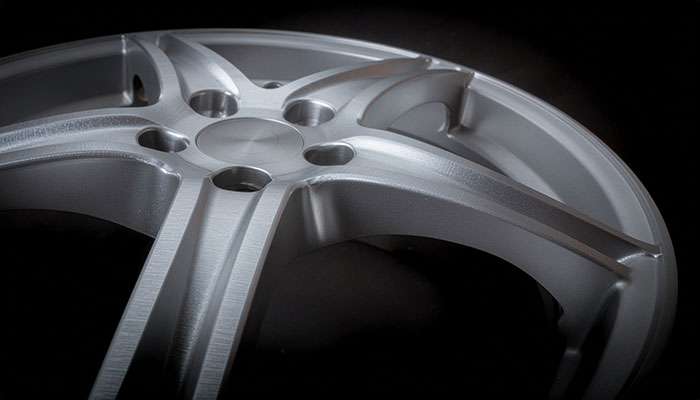
Forged alloy wheels stand at the pinnacle of wheel manufacturing technology, offering unmatched strength-to-weight characteristics through an intensive production process. These premium options represent the gold standard for performance enthusiasts seeking maximum durability with minimal weight penalties.
The forging process begins with a solid aluminum billet, typically aerospace-grade 6061-T6 aluminum alloy. This aluminum chunk is heated under controlled high temperatures until it becomes pliable enough for forming. The heated metal then undergoes extreme compression—between 8,000 to 10,000 tons of pressure—fundamentally altering its internal structure.
This intense pressure realigns the aluminum's grain structure, forcing it to follow the wheel's shape. The directional grain pattern created through forging eliminates potential failure points like porosity, cavities, and other microdefects that plague cast wheels. The resulting material exhibits superior mechanical properties with much less material required.
After the initial compression, the forged wheel undergoes multiple refinement stages:
CNC machining to create the precise design and extract excess material
Heat treatment to enhance mechanical properties
Dimensional testing for perfect roundness and balance
Micro shot-blasting to compact the material surface
Protective treatments like chromation to prevent corrosion
Final painting and finishing processes
The completed wheel typically passes through stringent quality control measures, often including X-ray inspection and fatigue testing, ensuring exceptional structural integrity.
Advantages:
Superior Strength: Forged wheels can be up to 40% lighter yet 10% more stress-resistant than high-end OEM wheels
Optimized Weight: The compression process creates denser material, requiring less aluminum to achieve necessary strength
Enhanced Performance: The reduced unsprung weight improves acceleration, braking, and handling responsiveness
Better Heat Management: Forged wheels dissipate heat more efficiently than cast alternatives, benefiting brake performance
Customization Options: The manufacturing process enables virtually unlimited design possibilities with precise specifications
Improved Durability: When subjected to sudden impact, forged wheels resist cracking much better than cast alternatives
Repairability: Unlike cast wheels that typically break beyond repair, forged wheels can sometimes be repaired when damaged
Considerations:
Premium Price Point: The intensive manufacturing process makes forged wheels significantly more expensive
Limited Availability: Many forged wheels are custom made-to-order, requiring longer lead times
Maintenance Requirements: Some forged wheels may need special care to maintain their appearance and performance
Less Shock Absorption: Forged wheels may transmit more road vibration than cast alternatives
Forged wheels command premium prices reflecting their advanced manufacturing processes. Most monoblock forged wheels start at $400-500 per wheel, yet premium custom-made options frequently exceed $1,000 each.
Complete sets typically range from several thousand dollars upward, representing a substantial investment over cast alternatives. High-end custom forged wheels from specialists like Forgeline might range from $5,000 to $13,000 per set, depending on size, design complexity, and finish options.
This significant price difference exists primarily because:
Each wheel often requires extensive handwork and finishing
The manufacturing process is more resource-intensive
Many forged wheels are custom-made rather than mass-produced
Higher-quality materials and stricter quality control measures are employed
Forged wheels excel in applications where performance benefits justify their premium investment:
Competitive Motorsports: Racing environments demand maximum strength with minimum weight, making forged wheels the standard choice for serious competition.
High-Performance Street Cars: Vehicles whose owners prioritize handling precision and acceleration benefits gain measurable advantages from reduced unsprung mass.
Track Day Enthusiasts: Regular track participants benefit from improved heat management during sustained high-performance driving.
Premium Luxury Vehicles: High-end automobiles often pair with forged wheels for both their performance attributes and exclusivity factor.
Heavily Modified Vehicles: Cars with significant power upgrades benefit from the superior strength characteristics of forged wheels, especially when running wider tires or aggressive fitments.
Discerning Enthusiasts: Those seeking the absolute best in wheel technology often choose forged wheels primarily for their engineering excellence and uncompromising quality.
When performance matters more than price, forged wheels represent the ultimate expression of wheel technology. Their growing popularity among enthusiasts reflects an increasing appreciation for quality components that deliver tangible performance benefits alongside undeniable exclusivity.
When selecting the right alloy wheels for your vehicle, having a clear comparison helps you make an informed decision. Our expert team has compiled this comprehensive comparison of the four main types of alloy wheels to help you understand the key differences and choose the option that best fits your needs and budget.
Attribute |
Aluminum Alloy |
Magnesium Alloy |
Cast Alloy |
Forged Alloy |
Weight Characteristics |
Significantly lighter than steel |
30-40% lighter than aluminum alloy |
Heavier than forged options |
Up to 40% lighter than OEM wheels |
Manufacturing Process |
Molten aluminum (95-99%) with other elements poured into molds |
Cast or forged using specialized magnesium alloys |
Gravity or low-pressure casting of molten aluminum |
Compressed aluminum billet under 8,000-10,000 tons of pressure |
Price Range (per wheel) |
$140-285 |
$2,800-3,300 |
$140-250 |
$400-1,000+ |
Primary Advantages |
- Good heat dissipation |
- Extreme weight reduction |
- Cost-effective |
- Superior strength |
Main Disadvantages |
- Higher cost than steel |
- Very expensive |
- Heavier construction |
- Premium price point |
Best Use Cases |
- Daily drivers |
- Professional motorsport |
- Daily drivers |
- Competitive motorsports |
This comparison table shows the distinct characteristics of each wheel type. Cast alloy wheels offer the best value for most drivers, while aluminum alloy wheels provide a good balance of performance and affordability. For those seeking maximum performance, magnesium and forged options deliver superior capabilities at premium prices.
At Performance Plus Tire, we understand that choosing the right alloy wheels can seem overwhelming with so many options available. After exploring these four popular types, you're now equipped with the knowledge to make a confident decision that matches your driving needs and budget.
Our experience shows that aluminum alloy wheels offer the best balance for most drivers, delivering solid performance improvements with reasonable pricing. Cast alloy wheels remain the popular choice because they provide excellent value and endless design possibilities at accessible price points.
For those seeking maximum performance gains, magnesium alloy wheels deliver unmatched weight savings that serious enthusiasts and racers appreciate despite the premium investment. Forged alloy wheels represent the pinnacle of wheel technology, offering exceptional strength-to-weight characteristics that benefit both motorsport applications and discerning street enthusiasts.
Your vehicle usage should guide your final selection. Daily drivers and commuter vehicles perform excellently with cast or aluminum alloy options that balance cost with performance benefits. Track day enthusiasts and performance-focused drivers will appreciate the advantages that forged or magnesium wheels provide, even at higher price points.
Remember to consider factors beyond appearance alone. Weight reduction improves acceleration and fuel efficiency, while superior heat dissipation enhances brake performance during spirited driving. The durability requirements for weekend cruising differ significantly from competitive track use.
We're confident that upgrading to quality alloy wheels will enhance both the appearance and performance of your vehicle compared to basic steel alternatives. Our expert team is ready to help you find the perfect wheels that meet your specific requirements and budget.
Ready to upgrade your ride? Our knowledgeable staff can guide you through the selection process and ensure you get the ideal wheels for your vehicle.
Understanding the four main types of alloy wheels helps you choose the right upgrade for your vehicle's performance needs and budget in 2025.
• Aluminum alloy wheels offer the best balance - combining reasonable weight reduction, good heat dissipation, and esthetic appeal at $140-285 per wheel for most drivers.
• Cast wheels dominate the market for good reason - providing excellent value with unlimited design possibilities at the most accessible price points ($140-250 per wheel).
• Magnesium wheels deliver extreme performance gains - offering 30-40% weight reduction over aluminum but at premium prices ($2,800-3,300 per wheel) for serious enthusiasts.
• Forged wheels represent the ultimate choice - providing superior strength with optimal weight reduction ($400-1,000+ per wheel) for competitive motorsports and high-performance applications.
• Match wheel type to your actual driving needs - daily drivers benefit most from cast or aluminum options, while track enthusiasts should consider forged or magnesium despite higher costs.
The right wheel choice balances your budget, performance requirements, and esthetic preferences while considering factors like weight reduction's impact on fuel economy and heat dissipation's effect on brake performance.
The four main types of alloy wheels in 2025 are aluminum alloy, magnesium alloy, cast alloy, and forged alloy. Each type offers unique benefits in terms of weight, strength, performance, and price.
Cast alloy wheels are more affordable and offer good design versatility, but are generally heavier and less durable than forged wheels. Forged alloy wheels provide superior strength and lighter weight, but at a significantly higher cost.
Magnesium alloy wheels offer extreme weight reduction (30-40% lighter than aluminum), superior heat management, and exceptional vibration damping. However, they are very expensive and may have corrosion concerns.
Alloy wheels can improve vehicle performance by reducing unsprung weight, which enhances acceleration, braking, and handling. They also provide better heat dissipation, which can benefit brake performance during demanding driving conditions.
When selecting alloy wheels, consider your budget, driving habits, desired esthetics, and performance needs. Also factor in wheel size, offset, bolt pattern, load rating, and compatibility with your vehicle's make and model.